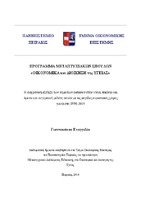H διαχρονική εξέλιξη των δημοσίων δαπανών στην υγεία, παιδεία και άμυνα και συγκριτική μελέτη αυτών με τις μεγάλες ευρωπαϊκές χώρες για τα έτη 1996-2015

Προβολή/
Λέξεις κλειδιά
Δημόσιες δαπάνες ; Υγεία ; Παιδεία ; Άμυνα ; Δημόσιος τομέας ; Οικονομική κρίση ; Ευρωπαϊκή Ένωση ; Public expenditure ; Health ; Education ; Defense ; Public sector ; Economic crisis ; European UnionΠερίληψη
Η οικονομική κρίση, που έπληξε πριν από μια δεκαετία περίπου τις Ηνωμένες Πολιτείες Αμερικής και συνεπακόλουθα επηρέασε σε μεγάλο βαθμό τις χώρες της Ευρωπαϊκής Ένωσης, αποτελεί μια χρονική περίοδο «ορόσημο» για την εξέταση διάφορων σημαντικών οικονομικών μεγεθών. Κι αυτό διότι σημαντικά οικονομικά στοιχεία των κρατών μελών της Ένωσης, όπως οι δημόσιες δαπάνες, τα ακαθάριστα έσοδα, τα φορολογικά έσοδα, καθώς και άλλα είδη εσόδων και εξόδων επηρεάστηκαν σημαντικά με την έλευση της οικονομικής κρίσης. Για τις περισσότερες χώρες της ΕΕ ισχύει ότι αντιμετώπισαν κάποιο περιορισμό στις δαπάνες τους, διότι η ευρύτερη πορεία της οικονομίας περιόρισε τα έσοδα για τα κράτη και τις επιχειρήσεις. Η Ελλάδα, εκτός από την παραπάνω δεδομένη κατάσταση κλήθηκε να αντιμετωπίσει την κρίση χρέους και τελικά να ακολουθήσει -μέχρι σήμερα- τέσσερα προγράμματα δημοσιονομικής αναπροσαρμογής, τα οποία εκτός των άλλων μείωσαν σημαντικά τις δημόσιες δαπάνες της χώρας για λόγους εξοικονόμησης πόρων προκειμένου να μπορέσει η Ελλάδα να αποφύγει την χρεοκοπία. Οι τομείς της υγείας, της παιδείας και της άμυνας αποτελούν αφενός τους πιο πολυδάπανους τομείς και αφετέρου τους τομείς που κλήθηκαν να αντιμετωπίσουν σημαντικές περικοπές στα έσοδα τους διότι περιορίστηκαν σε μεγάλο βαθμό οι δημόσιες δαπάνες εν καιρώ κρίσης, όπως θα παρουσιαστεί στην παρούσα μελέτη. Σκοπός της εργασίας αυτής είναι η μελέτη της διαχρονικής εξέλιξης των δημοσίων δαπανών στην υγειά, την παιδεία και την άμυνα από το 1996 έως 2015 και σύγκρισή τους με τις μεγάλες ευρωπαϊκές χώρες. Είναι γεγονός ότι κατά την υπό μελέτη δεκαετία οι δημόσιες δαπάνες σημειώνουν αρχικά αυξητικές τάσεις, αλλά από την έλευση της κρίσης και μετά, ειδικά για την Ελλάδα, οι δαπάνες μειώνονται σημαντικά.


